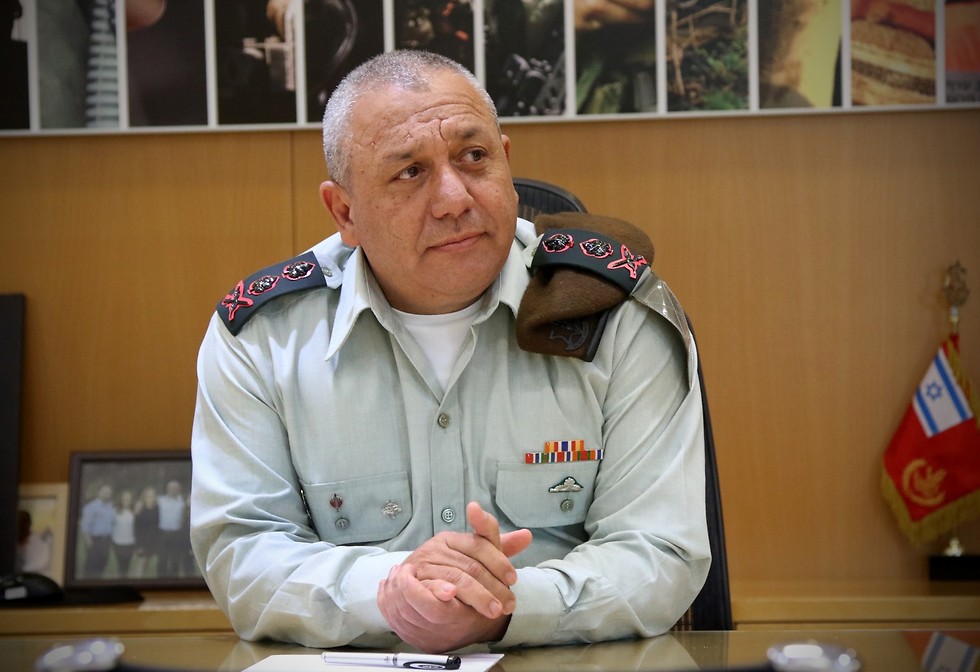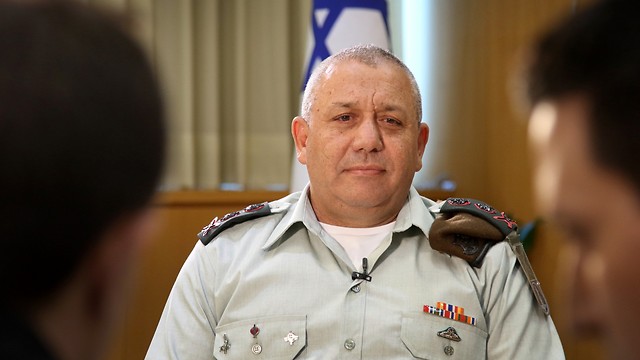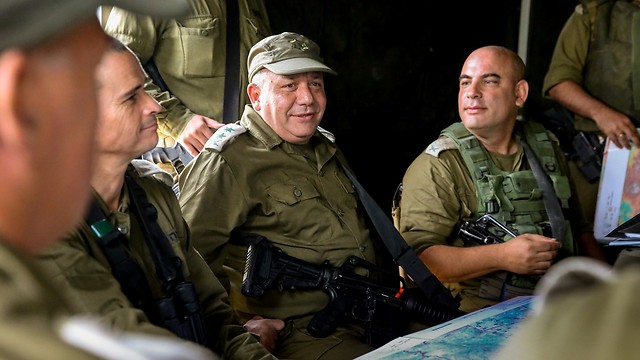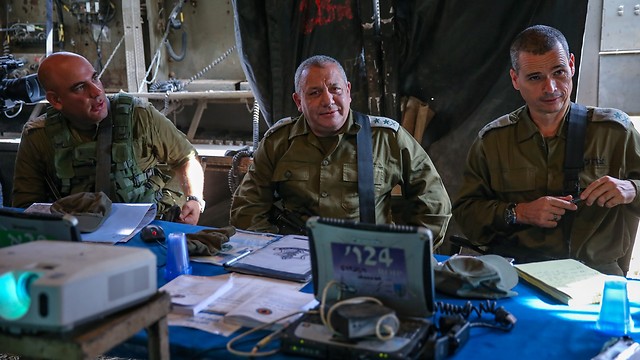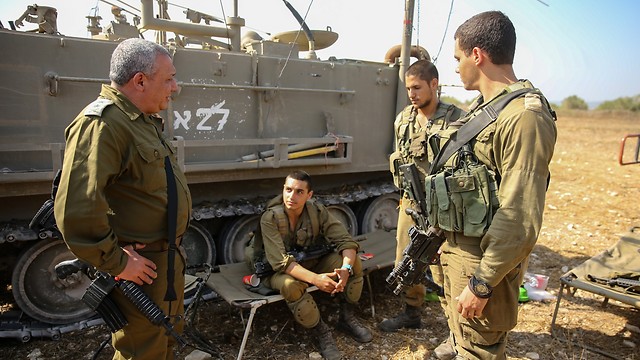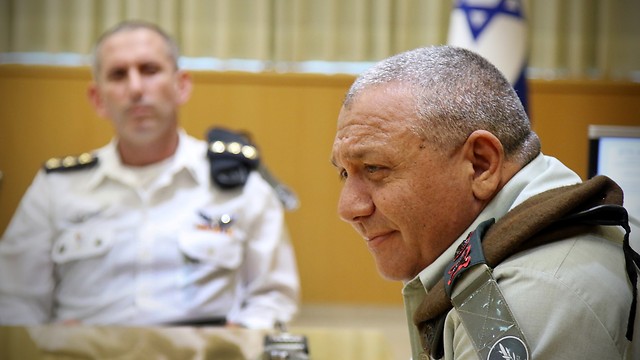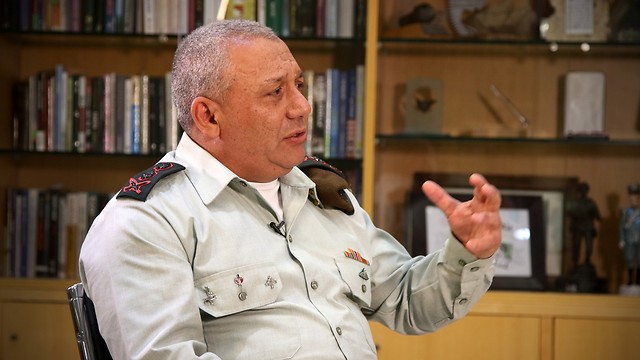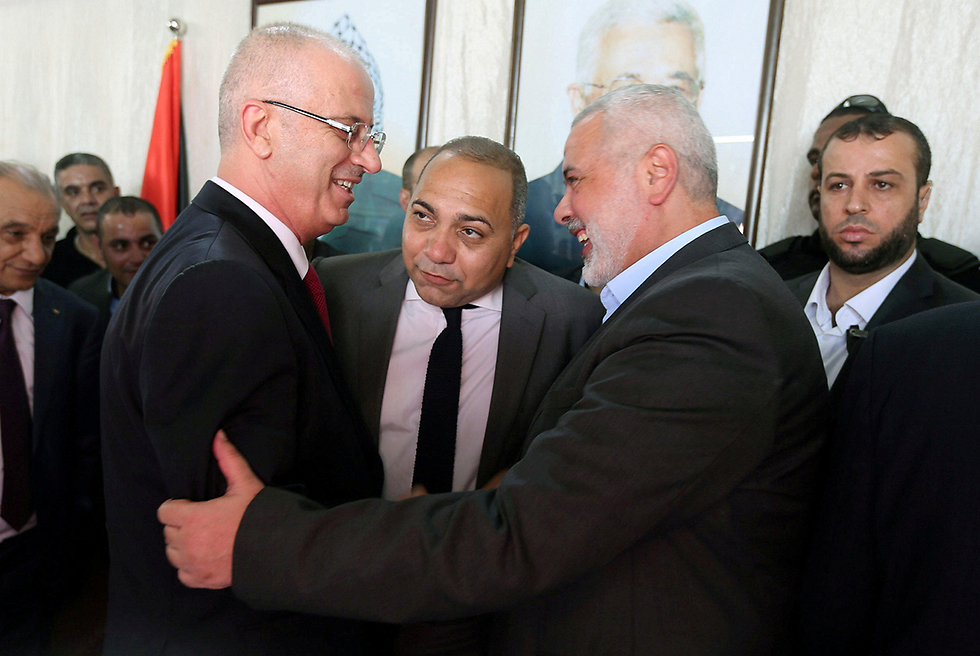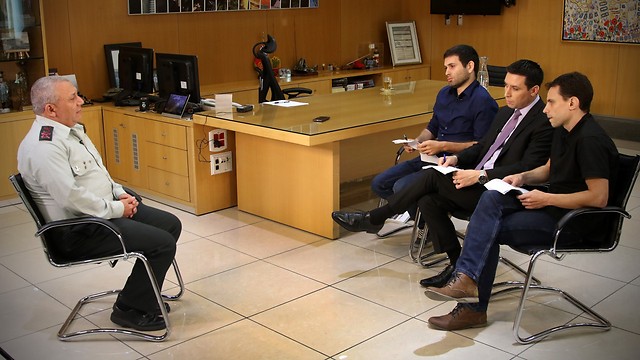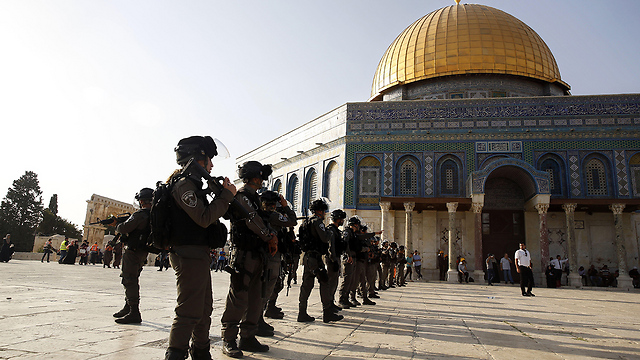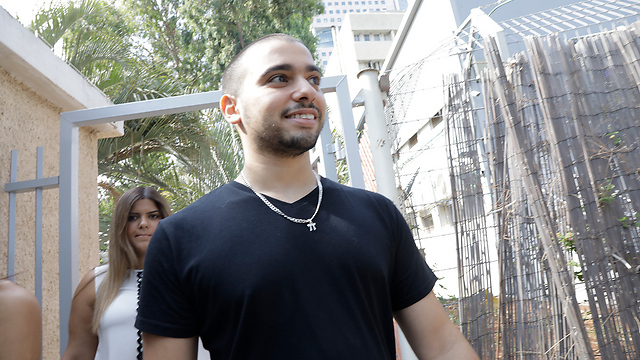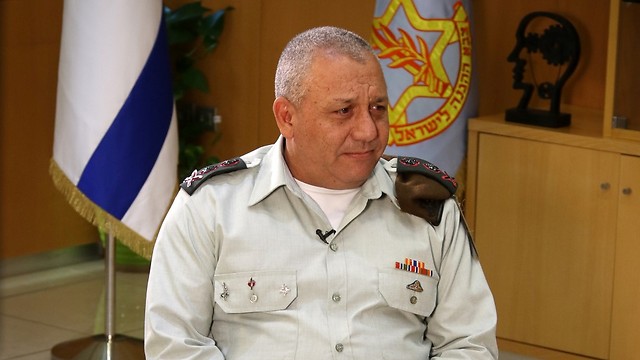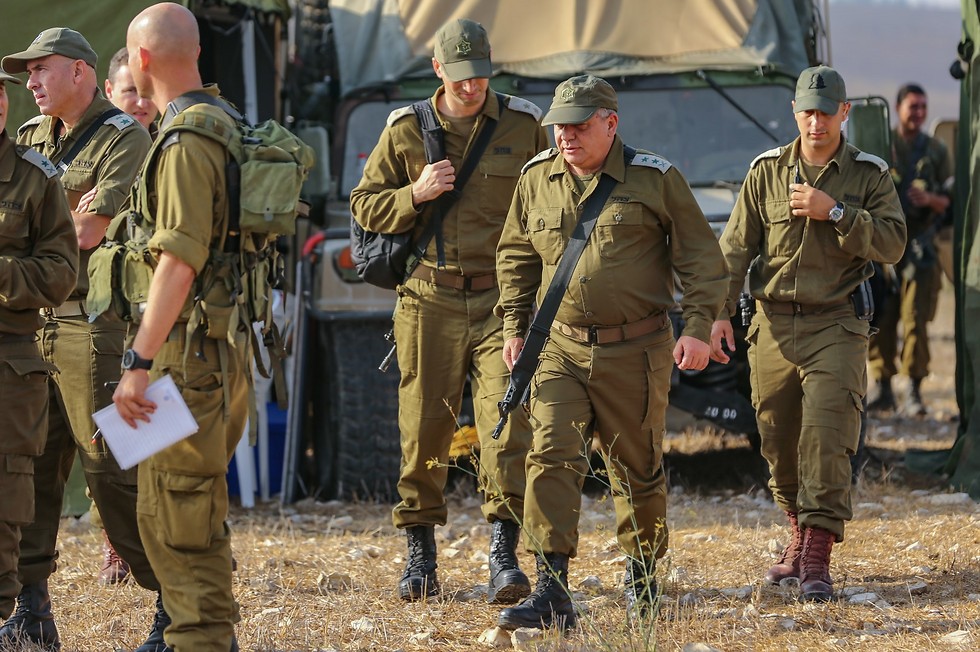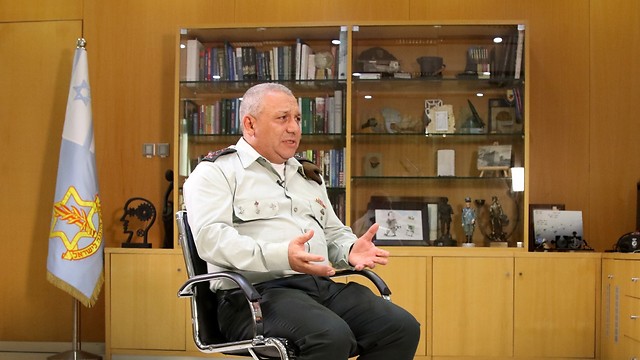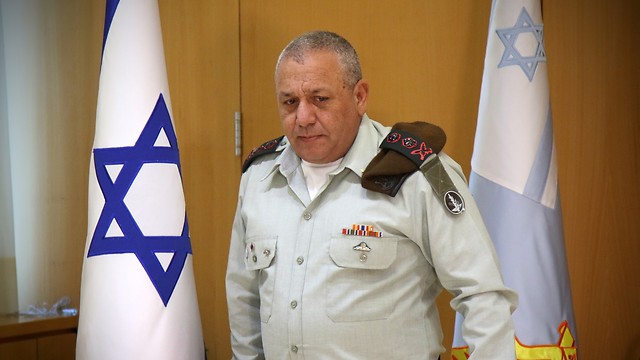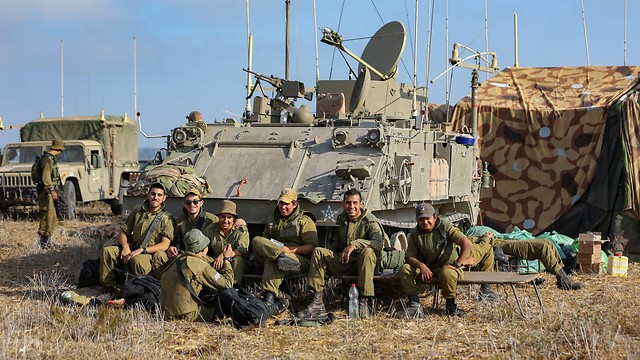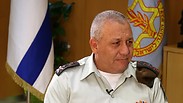

'Hundreds of strikes without retaliation—this shows extent of IDF's deterrence'
In his first interview since taking office, IDF Chief of Staff Eisenkot tells Ynet about the IDF's covert operations to stop Iranian aid to Hezbollah and Hamas, talks about attempts to get Nasrallah, and discusses both the Azaria case and the submarine affair.
The scenario for the breakout of the next war, which the IDF's Northern Command has recently drilled as part of a large-scale training exercise, includes the infiltration of Hezbollah fighters into an Israeli community.
"We have intelligence, we have fortifications and we have offensive plans to thwart it," the IDF chief tells Ynet. "I can't guarantee there wouldn’t be an infiltration into Israel's territory and into a community. I can guarantee high efficiency in defense, I can guarantee that if anyone infiltrates the State of Israel, we would kill them. We would prevent (Hezbollah) from having any significant achievements. Both Hezbollah and Hamas understand the unbearable price they would have to pay for infiltrating an Israeli community and harming civilians."
With the High Holy Days marking the start of a new Jewish year, IDF Chief of Staff Lt. Gen. Gadi Eisenkot looks to the north, where he sees the gravest threat to Israel in the region.
In his first interview since taking office as the IDF's top commander, Eisenkot talks about the preparations for a war with Hezbollah, past and maybe future efforts to eliminate its leader Hassan Nasrallah, and the greatest enemy of all—Iran.
Eisenkot also discusses the other threats and issues that have placed the IDF, and him, in the spotlight over the last year: From Elor Azaria to the submarine affair.
‘Hezbollah is the enemy we’re concerned about’
A caricature hangs on the wall of the IDF chief's office depicting Nasrallah, Syrian President Bashar Assad, and former Iranian president Mahmoud Ahmadinejad looking at Eisenkot, then still a major-general, in his combat uniform and his yet-to-go-gray hair, on the day he was discharged from the IDF. "I have a feeling we'll be seeing him again," the three say with a wicked smile.
The caricature is from 2011, when Eisenkot had one leg out the door, after he finished his term as the GOC Northern Command and following the nomination (which was later withdrawn) of Maj. Gen. Yoav Galant to IDF chief.
Alongside the prophetic caricature is a metal statuette of an infantry soldier's shoes made of shrapnel from mortar shells and rockets launched at Israeli communities on the Gaza border. The shoes are walking on a sketch of the map of Israel. This farewell present from his former head of office, Col. Nir, is more of a depiction of Eisenkot's current role as an intrepid Golani infantryman who has no qualms about marching down a long path, charging with zeal at any goal he sets for himself and achieving it.
Currently, after the 21st IDF chief's term has crossed its halfway mark, Eisenkot continues working diligently to change the face of the Israeli military. Just before the beginning of the High Holy Days, Ynet joined him on the training grounds in the north and at his 14th floor office in the Kirya IDF Headquarters base for an in-depth interview.
The word Eisenkot keeps using during the interview is "stateliness." As a follower of David Ben-Gurion, the first Israeli premier’s legacy of “stateliness” is one of the main assets Eisenkot is fighting to keep in the IDF. Sometimes, he does so while swimming against the current.
“The most important thing for the IDF in order to continue realizing its mission for many years to come is, in my eyes, the public’s trust. Even if there is an argument over one incident or another,” he says. “Our approach is to be stately and professional. The IDF enjoys high regard in Israeli society, and we need to bolster this with professional, moral and impartial work.”
Our first meeting took place in the field on the final day of the large-scale Northern Corps training exercise, which simulated an all-out war against Hezbollah. The decision in principle to hold this massive drill was among the first he made when he took over the IDF's reins.
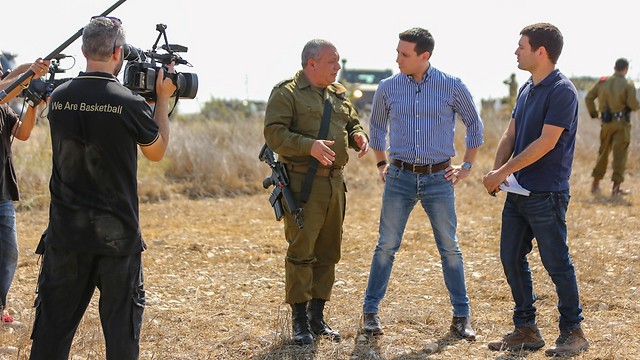
Tens of thousands of soldiers, dozens of fighter jets flying overhead, hundreds of vehicles rolling across the northern soil—all taking part in a drill that even for Eisenkot was “the largest I’ve participated in, larger than the last Northern Corps exercise in 1998, when I was the Golani Brigade commander.”
Are we facing imminent war?
“At the moment, I don’t see desire or motivation in any of our enemies to attack, to intentionally start a war. Our experience has taught us that our test as an army should center on capabilities. There is significant capability (to start a war) in Lebanon and certain capability in Syria.
“Hezbollah is a semi-military organization, with many components and aspects of a military. It has gained experience over the last few years in the kind of fighting I don’t take lightly: It operated battalions and brigades, received offensive aid, made intelligence collection efforts. Alongside that, Hezbollah also paid a very steep price—2,000 of its men were killed and some 7,000 wounded.
“Hezbollah is the enemy we’re concerned about right now, more than any other enemy around us, but the strategic balance massively tips in the IDF’s favor.”
Defense Minister Lieberman has said that in the next confrontation in the north, Lebanon will burn on several fronts.
“I don’t like making threats and declarations. We have a use-of-force policy that is far more significant than what the average Israeli civilian can see. We’ve significantly improved our capabilities, including in intelligence, since 2006. I have no doubt the IDF has the ability to defeat Hezbollah and minimize, as much as possible, the price paid by the Israeli home front.”
How will the next war look?
“The IDF is operating to defeat its enemies and increase our periods of calm. But if we have to go to war—the IDF’s enemies would find themselves facing a sharper, stronger and more professional army than ever before.”
As the one who rehabilitated the Northern Command in the five years that followed the war in 2006, Eisenkot has become identified with the Dahiya doctrine: The use of disproportionate force to destroy the Hezbollah stronghold in Beirut, which to this day serves as the underlying deterrence for Nasrallah.
“We tried to get Nasrallah at the beginning of the war. We attacked the building he was living in and the one that served as his bunker," Eisenkot admitted. "Throughout the war we tried to track him down. He knows why he’s been living in a bunker for 11 years. He doesn’t dare go outside, even though he’s an admired figure in Lebanon.”
'Working to stop Iranian entrenchment in Syria'
During Eisenkot’s tenure, the IDF has stepped up what has been dubbed as “operations between wars”—missions designed to thwart Hezbollah and Harmas’s efforts to arm themselves with advanced weaponry. In fact, special air, naval and land forces have been splitting their time in recent years between training and such covert activity, to which Eisenkot dedicates a significant portion of his time.
“The IDF is working around the clock to allow Israel’s citizens to live in security. Our forces operate overtly and covertly every night to complete their missions,” he says.
Some of these operations are meant to prevent the conversion of thousands of Hezbollah’s rockets and heavy missiles into precision-guided munitions at factories Iran is planning to build in Lebanon or Syria. Improving the accuracy of these projectiles would allow Hezbollah to hit within a radius of no more than a 100 meters from their target—be it the IDF Headquarters in the Kirya, the Ramat David Airbase or the Haifa refineries.
“We consider accurate munitions to be a very severe strategic threat to the State of Israel. We’ve been dealing with the aspiration to reach this capability for years now and have worked to prevent it, so far successfully. At present, there are no precision-guided munitions threatening Israel’s strategic locations,” Eisenkot assures.
“To the credit of the defense minister and the Cabinet, I can say the IDF enjoys very broad operational freedom. I can’t remember an operation we recommended that we’ve not been allowed to carry out. Our ‘operations between wars’ have not led to escalation because our enemies understand we’re hitting the capabilities that need to be targeted. We carry out many types of operations, some of them violent, and only a small portion becomes known.
"In hindsight, it led to many achievements. We have intelligence and aerial superiority that creates great deterrence for the IDF. It’s a fact that we’ve carried out hundreds of attacks in several types of operations, and there hasn’t been any retaliation. It shows the great deterrence the IDF has, while at the same time we understand ‘deterrence’ is a slippery concept.”
While the prime minister has publicly confirmed Israel’s attacks in Syria, the situation in Lebanon is a lot more complex.
“A status quo has been established following the Second Lebanon War, in which attacks in Lebanon have only been done in response to incidents,” Eisenkot says. “And security calm has been established on both sides on the border. Our challenge is on the one hand to prevent the emergence of a severe strategic threat such as precision-guided munitions, while on the other hand maintain the security calm that has lasted for 11 years now, benefiting residents on both sides.
“The only thing that has is new over the last year is the Lebanese state taking responsibility,” the IDF chief stresses. “This is the choice made by Saad Hariri as prime minister and (Michel) Aoun as president. Shortly after Nasrallah and his men make belligerent declarations on the border, Hariri goes and tries to keep the peace. And he went to the United States, where he was met with the demand for the Lebanese state to take responsibility. So recently, the Lebanese army chief boasted a victory in Qalamun, and then he said, ‘We’re now going to claim our responsibility in the south.’
“This is a process that takes time. Our intelligence shows Nasrallah still maintains a presence in all of the villages—and certainly the Shiite ones—near the Israeli border and is developing its capabilities there almost completely undisturbed. In this complex reality, the wise thing is smart management.”
'All options on the table' regarding Iran
As of late, Prime Minister Benjamin Netanyahu has been putting the Iranian nuclear program back on the international agenda in light of Tehran’s entrenchment in Syria. The prime minister discussed the matter with US President Donald Trump and spoke about it at length in his speech at the UN General Assembly, but it is doubtful Netanyahu could achieve his goal of having the nuclear agreement canceled.
“The agreement is a fact,” the IDF chief says, refusing to directly address the question of whether scrapping the deal would be good for Israel’s security. “It’s an agreement that has holes, and as far as we’re concerned, it should’ve had more teeth, been more strict and included tighter supervision. An Iranian nuclear bomb is a danger to Israel, and we will continue monitoring to prevent them from (achieving) it via covert and indirect channels.”
Are the Iranians in compliance with the agreement?
“They’re in compliance with the agreement for tactical reasons. Their long-term strategic goal is to obtain nuclear capabilities. There is no doubt about it. The IDF’s challenge of preventing Iran from obtaining nuclear capabilities has been at the top of our list of priorities over the past decade. This mission will continue being a top priority, since we understand this is a threat on a different scale.”
Is the military option still on the table?
“When the political ranks say the State of Israel has the ability and that all options are on the table, they say so based on existing military ability. Meaning, the IDF has basic plans, it has the ability and if the IDF is required for the task, it would know how to act and meet the objectives set to it by the political ranks.”
How does the threat from North Korea change the picture?
“The State of Israel shouldn’t be the first to tackle any threat on Earth. Our challenge is to prevent this phenomenon in Iran. That is the challenge of the region’s countries—mostly the moderate Sunni camp—as well as of Europe and the United States.”
Beyond its nuclear aspirations, Eisenkot stresses, “Iran views itself as a regional power. There are 17,000 fighters in Syria today working under Iranian guidance, including 7,000 Hezbollah fighters, 9,000 Shiite militiamen, and 1,000-2,000 Iranians, with Tehran seeking to increase those numbers.”
How close are they to Israel’s border?
“Only a few of them are close to our border; most of them are in north-western, central or eastern Syria. We’re pursuing several different avenues to prevent Iranian entrenchment within 30-40km of the border, and we’re operating in quite a few avenues to minimize the missile accuracy capabilities Iran is trying to give our enemies, Hezbollah and Hamas. We want to get to a point where there is no Iranian influence in Syria, and this is being done in a combined military and diplomatic effort.”
Despite the strengthening of the Shiite axis, which bolstered Syrian President Bashar Assad with Russian help, Eisenkot is not quick to declare the end of the “Islamic State” (ISIS) threat and confirms for the first time the IDF’s part in the fight against ISIS.
“It’s too early to eulogize ISIS, because it is a phenomenon and an idea beyond being an organization. The fight against ISIS will continue for many years,” he says.
“Since our intelligence capabilities are the best in the area, and certainly in Israel’s close vicinity, we contribute to the effort to defeat ISIS and the Nusra Front. We do with this our allies, sharing intelligence to support this effort. We pass on information to countries when we know something is in the works (in those countries). The (Israeli) intelligence community greatly contributes to thwarting terror attacks in the Middle East and elsewhere around the globe.”
'Hamas will be taking a very big risk if it attacks us'
There are changes in Gaza, at least on the outside. Do you see any change concerning Hamas?
“The security situation at the Gaza border since Operation Protective Edge is complex. On the one hand, there’s unprecedented calm, the kind of which we haven’t seen since 1967. It’s been three years now that not a single Israeli citizens has gotten so much as a scratch. Unfortunately, one IDF soldier was lightly hurt, and several dozen rockets were fired—mostly close to the border. We are able to deter Hamas and allow for a very good security situation both on our side and theirs.
“On the other hand, Hamas has been working to increase their power, including building up their underground capabilities, particularly the defensive ones, and attempting to obtain more rockets so they can return to some of the capabilities they had in the past.
“The reality in the Gaza Strip is very concerning, because the economic-civic-humanitarian situation is very bad: the power supply is 4-6 hours a day, the water quality is low, 47 percent unemployment. Our interest is for there to be a good quality of life there, for the Gazans to have hope. At the same time, we’re not forgetting they are holding two bodies of IDF soldiers and two Israeli citizens who crossed the border, who should all be returned to the State of Israel.”
What is your position, as the IDF chief, on the topic?
“This is a conversation that should not be had in public. It gives Hamas an advantage. They take advantage of our openness and our sensitivity when it comes to human life. They take advantage of the families’ distress, which is why we are taking steps to make things very difficult for the Hamas leadership, which will only increase. At the same time, we ensure the Gaza population can live their lives and not go hungry because of its irresponsible leadership.
“At the moment, the Hamas government in the Gaza Strip is strong and dominant, but faces quite a few difficulties. This was reflected when Hamas agreed to disband its administrative committee and seemingly begin reconciliation, though it doesn’t really want full reconciliation. The distress Hamas has been in since Operation Protective Edge has led it to a series of concessions to relieve the immense pressure it has been under.
“Our interest is to not have a Hamas regime in the strip, but rather a more moderate government. I don’t see any moderate government except for the Palestinian Authority, despite all of its shortcomings.”
Is the IDF concerned that continuing building the Gaza subterranean obstacle , which is meant to stop cross-border tunnels, might lead Hamas to use a tunnel that crosses into Israel?
“We take this possibility into account, because an army naturally looks at the risks rather than the opportunities. So we view this as a risk. But we are facing this risk from a position of power. If we uncover attack tunnels crossing into our territory, we’d deal with it very gravely, as we’ve done in recent years. We carried out attacks, a numerous amount of times. Even when we thought it would hurt Hamas, we continued carrying out hundreds of strikes since Protective Edge. And despite the fact we’ve attacked hundreds of times, not a single bullet has been fired in response. Hamas will be taking a very big risk if it attacks as a result of us uncovering its cross-border tunnels.”
Do you support the construction of a sea port in the Gaza Strip?
“I support a sea port in principle, but for a sea port and other big projects, like an industrial area, to be possible, some conditions need to exist.”
Preventing a third intifada
Eisenkot has served as the commander of the Judea and Samaria Division at the height of the second intifada and was one of the architects of the victory over suicide bombers, who have not reared their heads again since.
At the end of his first year as IDF chief, Eisenkot found himself, along with the top officers in the Central Command, once again dealing with a wave of terror attacks on the verge of escalating into a full-blown third intifada. The attacks, which claimed the lives of dozens of soldiers and civilians across Israel, were suppressed within a few months.
“We consider the Palestinian Authority responsible. The (Palestinian) security services are making an effort to thwart attacks because of internal Palestinian considerations,” he says.
Over the last month and a half, since the Temple Mount crisis, “the cooperation with the PA has been limited, but still to the benefit of both sides. The PA is in charge of the life of over 2.5 million Palestinians in Judea and Samaria’s areas A and B. There’s dialogue,” Eisenkot says.
Discussing how the IDF chose to tackle the wave of terror, Eisenkot says, “We’ve encountered a new phenomenon for the first time—not organized terrorism with proper weapons, but inspired terrorism. We were able to restore security because we’re very experienced in dealing with terrorism. We operated in a determined and focused manner, while distinguishing the terrorists from the population and creating positive incentives for the majority of the Palestinian population. Every morning, over 900,000 young Palestinians go to study, while half a million go to work in Israel and Judea and Samaria. This is a positive dynamic and we have a distinct interest in preserving it: On the one hand to determinedly fight terrorism, while on the other to continue to allow a better daily life for the population.”
Did you think of copying a part of this model to the strip and giving permits to Palestinians from Gaza to work in Israel?
“At this point, I don’t see work permits being issued, but definitely efforts to improve the civilian-economic reality with water and electricity projects, as well as bringing goods into the strip, alongside creating great difficulties to the Hamas leadership. This is a formula that is hard to implement, but it’s the right thing to do, because there are still 2 million people living there. If the Hamas leadership hadn’t cynically used two civilians who crossed the border and two bodies, I assume life in the strip would’ve been better.”
'We must not allow mob-mentality in the IDF'
Shortly before Yom Kippur, the IDF chief decided to grant Elor Azaria’s request to commute his 18-month sentence, which the former soldier had already begun serving at Prison 4.
Eisenkot decided to reduce four months from Azaria’s time, making it likely the former soldier, who shot dead a neutralized Palestinian terrorist in Hebron, will be out of prison within less than a year on good behavior.
How do you respond to criticism from the judges in the first verdict, who said the IDF’s top command and then-defense minister Moshe Yaalon came out with statements against Azaria too soon, before the investigation was completed?
“My first comment as IDF chief was made a month and a half after the incident,” Eisenkot clarifies.
“The IDF spokesman made a comment on the topic on the same day in front of the cameras, describing the incident as one that began with the attempted murder of two soldiers and praising their actions. He then said it appeared like an abnormal incident occurred after the attack, in which a soldier decided 11 minutes later to open fire at a Palestinian lying on the ground a meter away from his commander. At the same time, the IDF spokesman expressed the army’s view that the soldier was innocent until proven otherwise. The position the IDF took was professional and ethical,” the IDF chief insists.
“If you ask me today, in hindsight, if it was the right thing to put handcuffs on the soldier, my answer is no, but this is a longstanding procedure. Was it right to charge him with murder? This is another procedural manner no commander can influence. These are things I can’t determine myself, as the decision here is professional, legal.”
The two procedures—handcuffing and charging with murder—have since been nixed for similar cases of soldiers arrested for an alleged offense committed under operational circumstances.
Eisenkot stresses that, “Beyond the position the commanders took, our approach was to let the investigation take its course, act fairly, allow for the presumption of innocence. I can only regret greatly the cynical exploitation of this event to drum up support, get publicity, try to influence commanders, and try to influence the court. I think this is an undesirable situation.”
What did you make of the hateful chants outside the Kirya IDF Headquarters, such as ‘Gadi beware, Rabin’s looking for a friend,’ ‘This night, Gadi, you will die’?
“I heard it and I can’t say I liked it. I know it is an opinion held by only a few people. I regret the hateful discourse surrounding this incident. There was similar discourse surrounding co-ed service (which was harshly criticized in religious circles) and the desire to influence the IDF’s character from the outside.”
This kind of discourse doesn’t exist in a vacuum. Some politicians dragged the IDF into this argument.
“Any external attempt to influence the army’s positions, norms, values and its courts is wrong. I hope lessons are learned from this and the military justice system, which is clean, is allowed to make the IDF stronger, more ethical and more professional. I have no expectations from a mob, but I do have expectations from leaders, and everyone should learn from this, myself included.
“The IDF’s commanders should be allowed to dictate the army’s values. We can’t hide behind civilian discourse. We’re leading soldiers in missions and must make every effort to bring them back safe and sound, and commanders took a stand based on these values. I give my full support to the commanders, even if errors were made along the chain of command.
“When I arrived at the scene two days later for the reconstruction of the incident, I understood the distress and the difficulties, but at the same time I also understood the professional approach the commanders took when they decided after three hours that the incident has surpassed the chain of command, and that a legal investigation must be conducted.”
Did this incident cause damage to the IDF?
“In the short term, the IDF was hurt by this incident. In the long term, this would make the IDF a stronger, more professional and more ethical army that can draw the line. I said this, and I don’t regret it: We must not allow mob-mentality in the IDF, as it would only encourage behavior that deviates from the orders, values and norms set by the commanders.”
What is your message to Azaria?
“Azaria is a young Israeli man who chose to serve in a combat unit, and I greatly respect him for that. However, in this case, both courts and the chain of command have made their position known in a very clear manner.”
'I hope those involved in submarine affair are innocent'
Another issue that hits close to home for Eisenkot is the submarine affair. So far, no IDF officer currently serving in the army has been questioned in connection with the affair. Even the allegations attributed to former Navy commander Maj. Gen. (res.) Eliezer Marom concern the years following his retirement from the IDF.
However, it is possible current IDF officers might be questioned soon, and the IDF chief has already decided in principle to establish—likely after the completion of the police investigation—an internal inquiry team to deal with the issue of conflicts of interest for retiring officers.
“The historical understanding is that IDF officers don’t touch money. The IDF presents the operational needs and those required to fulfill those needs are civilian elements. The right thing is to set a very high wall separating officers and influential people,” he says.
“If there was a criminal offense and officers did have a hand in it, we would be sure to bring them to justice,” he adds.
“During the time in question (when Marom was the Navy commander), I was the GOC Northern Command. I know the people involved and hope they are without blame. I work under the assumption everyone is innocent under proven otherwise.”
There are currently five submarines in service in the Israeli Navy. Two of them are new and, according to foreign reports, are capable of carrying nuclear armament. An additional submarine, INS Dakar, will arrive from Germany in a year.
Eisenkot pointed out that, “Factually, the IDF has shown over the past decade that it needs 5 or 6 submarines to meet its operational needs. The additional deal being talked about (in the affair) included a 7th, 8th and 9th submarine. The new ones would be more advanced. Such a move requires looking 20-25 years into the future, how to properly build up the military. We’ve released a written position of the IDF’s requirements. Either way, when there was a (police) examination here, all of the material was gathered and passed on. We said that if the need arises to question officers, they will be there. I don’t know of any officer currently in the IDF who was summoned or is expected to be summoned for questioning.”
'At 18, everyone must put personal views aside and fight for security'
Earlier this month, the High Court of Justice tossed out an amendment to the Conscription Law that lowered the annual quota for ultra-Orthodox men being required to serve in the IDF. The court tasked the government with passing new legislation within a year that would prevent discrimination and equally distribute the burden of service.
If you ask Eisenkot, he’d be willing to conscript thousands of additional Haredim first thing tomorrow not just in the name of equality, but primarily for operational needs.
“Every 18-year-old man or woman needs to come to the IDF induction center and enlist, including the Haredim,” Eisenkot clarifies the IDF’s position.
“Today, only 67 percent of 18 year olds are required to enlist, and this is not right. Our aspiration is to make better use of the manpower, mostly when just ahead there’s going to be a cut to the length of service (which will cause a shortage of thousands of soldiers).”
According to Eisenkot, the IDF is willing to bear the costs of conscripting the Haredim and making the necessary adjustments of service conditions.
“This is what it means for the IDF to be the people’s army. You can’t say that and then have selective service,” he explains.
“We need to demand a general draft of all sectors of Israeli society. If there’s a wide-scale conscription of Haredim, they’d look at soldiers differently and won’t view them as something to attack. Today, there are 7,000 Haredim serving in the army, among them 400 are officers and career soldiers. This successful integration of Haredim makes the army stronger. This phenomenon of a Haredi soldier going home and being beaten is wrong and very serious. The aspiration is to have all parts of society help in carrying the burden of security,” he elaborates.
While Eisenkot is popular among the public, he still receives quite a lot of criticism and suffers abuse, perhaps more than any IDF chief before him.
He has been branded as a “leftist” for a series of moves that were not popular across the board, including canceling the exemption from shaving (which angered religious soldiers); increasing the amount of female soldiers in combat roles and launching a pilot to open the possibility of serving on tanks to women as well; instating co-ed service for men and women; bringing the separate Jewish Awareness Department under the Education Corps; condemning Elor Azaria’s actions; giving the ‘scissors speech’; supporting easing restrictions on the Palestinians in the West Bank; and supporting the plan to expand Qalqilya.
“All of these moves were meant to strengthen the IDF,” Eisenkot says. “Since 2008, the IDF has been operating without a co-ed service order, and it was destructive for the army. The commanders need such an order as guidelines on what should and should not be done, as well as give them tools to realize the IDF’s objective of being the people’s army, which brings together the city dweller and the small town man, the Druze, Bedouin and Jew, the Sephardic and the Ashkenazi, the religious and secular to carry out a shared mission, with the understanding that at age 18 you put your personal views aside and everyone comes together under the banner of security.”














